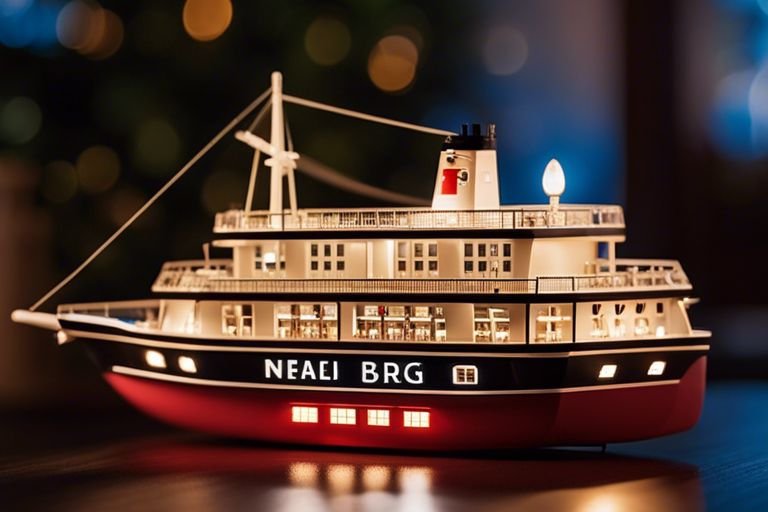Have you ever wondered if cruise ships have a jail onboard? As a seasoned traveler, I have come across several myths and rumors about the existence of detention facilities on cruise ships. Today, I am here to debunk these misconceptions and set the record straight. Yes, cruise ships do have detention facilities, however, they are not what you might expect. In this guide, I will provide you with an in-depth look at the truth about onboard jails, including when and why they are used, and what to expect if you ever find yourself in a situation that requires their use. So sit back, relax, and allow me to be your guide as we explore this fascinating topic.
Key Takeaways:
- There are onboard detention facilities on cruise ships, but they are not commonly referred to as “jails.” While some larger cruise ships do have designated holding areas for unruly passengers, they are typically small rooms and are rarely used.
- Onboard detention is a last resort for cruise ship staff. Cruise lines prioritize the safety and enjoyment of all passengers, so onboard detention is only used in extreme cases when other measures have failed to address disruptive behavior.
- Passengers can be detained for a variety of reasons, including illegal activity, violent behavior, or failure to comply with ship rules. Cruise ship staff are trained to de-escalate situations and resolve conflicts peacefully, but sometimes detention is necessary to ensure the safety of everyone on board.
- The conditions in onboard detention facilities are typically similar to those in other parts of the ship. Passengers in detention are still provided with basic necessities and are usually supervised by security personnel to ensure their well-being.
- Overall, onboard detention facilities are rarely used, and the vast majority of cruise passengers will never encounter them during their travels. While the existence of these facilities may be surprising to some, it’s important to understand that they are only a small part of the overall cruise ship experience.
Debunking Myths About Cruise Ship Jails
To answer the burning question on many people’s minds – no, cruise ships do not have traditional jails. There are certainly secure rooms onboard, but they are far from the jail cells you might imagine. The truth is, these facilities are used for temporary holding and are primarily for the safety and security of all passengers and crew. To provide further clarity, I will debunk some of the common myths surrounding cruise ship jails.
Types of Onboard Detention Facilities
There are different types of onboard detention facilities that cruise ships have for situations that may require temporary incarceration. Here’s a breakdown:
- Holding Rooms: These are secure rooms used to detain passengers or crew members until law enforcement can take over.
- Security Centers: These facilities are equipped for monitoring and detaining individuals who pose a threat to the safety of the ship.
- Medical Facilities: In some cases, individuals who are a danger to themselves or others may be temporarily held in the ship’s medical facilities.
After the situation is resolved, individuals are handed over to the proper authorities at the next port of call.
Tips for Avoiding Trouble on a Cruise
When it comes to staying out of trouble on a cruise, there are a few things you can do to ensure a smooth sailing:
- Follow the Rules: Familiarize yourself with the ship’s rules and regulations, and abide by them throughout your journey.
- Limit Alcohol Consumption: Drinking responsibly can help prevent careless behavior that could lead to detention.
- Respect Others: Treat fellow passengers and the crew with respect to avoid conflicts that could escalate into trouble.
The key is to enjoy your cruise while being mindful of your actions and the impact they may have on others.
Step-by-Step Guide to Handling Onboard Incidents
Incident:To handle onboard incidents smoothly, it’s essential to follow these steps:
| Stay Calm | Assess the situation and try to remain calm to make rational decisions. |
| Seek Help | Locate a crew member or security personnel to report the incident and seek assistance. |
| Cooperate | Comply with instructions from the crew and authorities to de-escalate the situation. |
| Documentation | If necessary, keep records and documentation of the incident for future reference. |
| Follow Up | After the incident is resolved, follow up with the appropriate authorities and the cruise line as needed. |
Factors That May Lead to Detention
Though thorough screening protocols are in place, certain factors may lead to detention on a cruise ship:
- Illegal Activities: Engaging in illegal behavior can result in detention and legal consequences.
- Disruptive Conduct: Causing disturbances or disruptions onboard may lead to detainment for the safety of others.
- Violations of Ship’s Policies: Ignoring or violating the cruise line’s policies and procedures can result in detainment.
The bottom line is to adhere to the rules and regulations set by the cruise line to avoid any potential trouble.
Pros and Cons of Having a Jail on a Cruise Ship
When it comes to the presence of detention facilities on a cruise ship, there are various pros and cons to consider:
| Pros | Cons |
| Enhanced Security Measures | Potential for Negative Publicity |
| Rapid Response to Incidents | Perception of Safety Concerns |
| Protection for Passengers and Crew | Potential Legal Ramifications |
| Prevention of Major Issues | Potential for Misuse of Authority |
| Control Over Troublesome Situations | Impact on Overall Passenger Experience |
Having a jail on a cruise ship serves as a necessary precaution, but it also brings along certain concerns that must be carefully considered.

Do Cruise Ships Have a Jail – Debunking Myths About Onboard Detention Facilities
Ultimately, it is important to separate fact from fiction when it comes to the existence of jails on cruise ships. While it is true that cruise ships have a security center and may detain unruly passengers in a designated area, it is not accurate to refer to it as a “jail.” Cruise lines are equipped with security personnel and protocols to handle any disruptive behavior, and the majority of passengers will never encounter any issues that would result in being detained. It is important to approach this topic with an understanding of the security measures in place and to dispel any misconceptions about the presence of a full-fledged jail onboard a cruise ship.
FAQ – Debunking Myths About Onboard Detention Facilities
Q: Do cruise ships have a jail?
A: Yes, most cruise ships have a small detention facility, often referred to as a “brig” or “jail,” to handle any unruly or disruptive passengers. However, this facility is rarely used and is mainly reserved for serious offenses.
Q: What kind of offenses can land a passenger in the onboard detention facility?
A: Typically, only serious offenses such as physical altercations, illegal activities, or repeated disruptive behavior will result in a passenger being taken to the onboard detention facility. Minor incidents are usually handled by ship staff through warnings or other non-confinement measures.
Q: Are the conditions in the onboard detention facility similar to a regular jail?
A: No, cruise ship detention facilities are designed to hold passengers temporarily and are not equipped to serve as long-term confinement facilities. The conditions are basic and intended to provide for the safety and security of the passenger and other guests on the ship.
Q: What happens to a passenger who is taken to the onboard detention facility?
A: When a passenger is taken to the onboard detention facility, the ship’s security and management will conduct an investigation to determine the appropriate course of action. This may involve offloading the passenger at the next port of call or involving local authorities if the offense violates any laws.
Q: Can passengers be detained without due process or legal representation onboard a cruise ship?
A: Cruise lines are required to adhere to international maritime law, which includes providing due process and legal representation to any passenger facing serious accusations. While the process may differ from land-based legal systems, passengers are still entitled to certain rights when facing potential detention aboard a cruise ship.









